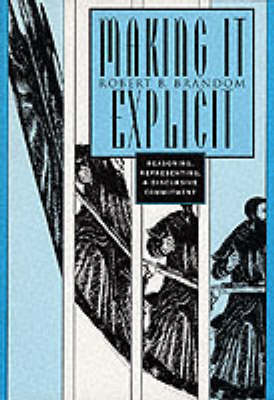
Making It Explicit
Harvard University Press (Verlag)
978-0-674-54330-0 (ISBN)
What would something unlike us--a chimpanzee, say, or a computer--have to be able to do to qualify as a possible knower, like us? To answer this question at the very heart of our sense of ourselves, philosophers have long focused on intentionality and have looked to language as a key to this condition. Making It Explicit is an investigation into the nature of language--the social practices that distinguish us as rational, logical creatures--that revises the very terms of this inquiry. Where accounts of the relation between language and mind have traditionally rested on the concept of representation, this book sets out an alternate approach based on inference, and on a conception of certain kinds of implicit assessment that become explicit in language. Making It Explicit is the first attempt to work out in detail a theory that renders linguistic meaning in terms of use--in short, to explain how semantic content can be conferred on expressions and attitudes that are suitably caught up in social practices.
At the center of this enterprise is a notion of discursive commitment. Being able to talk--and so in the fullest sense being able to think--is a matter of mastering the practices that govern such commitments, being able to keep track of one's own commitments and those of others. Assessing the pragmatic significance of speech acts is a matter of explaining the explicit in terms of the implicit. As he traces the inferential structure of the social practices within which things can be made conceptually explicit, the author defines the distinctively expressive role of logical vocabulary. This expressive account of language, mind, and logic is, finally, an account of who we are.
Robert B. Brandom is Distinguished Professor of Philosophy at the University of Pittsburgh and a Fellow of both the American Academy of Arts and Sciences and the British Academy. He delivered the John Locke Lectures at the University of Oxford and the Woodbridge Lectures at Columbia University. Brandom is the author of many books, including Making It Explicit, Reason in Philosophy, and From Empiricism to Expressivism (all from Harvard).
Preface PART ONE Toward a Normative Pragmatics Introduction From Intentional State to Normative Status From Norms Explicit in Rules to Norms Implicit in Practices From Normative Status to Normative Attitude From Assessment to the Social Institution of Norms From Intentional Interpretation to Original Intentionality Appendix: Wittgenstein's Use of Regel Toward an Inferential Semantics Content and Representation The Priority of the Propositional Conceptual Classification and Inference Material Inference, Conceptual Content, and Expression Circumstances and Consequences of Application Conclusion Linguistic Practice and Discursive Commitment Intentional States and Linguistic Practices Deontic Status and Deontic Attitudes Asserting and Inferring Scorekeeping: Pragmatic Significance and Semantic Content Perception and Action: The Conferral of Empirical and Practical Conceptual Content Assertions as Knowledge Claims Reliability Observation Reports and Noninferential Authority Rational Agency Practical Reasoning: Inferences from Doxastic to Practical Commitments Intentions PART TWO The Expressive Role of Traditional Semantic Vocabulary: 'True' and 'Refers' From Inference to Truth, Reference, and Representation Truth in Classical Pragmatism From Pragmatism to Prosentences Reference and Anaphorically Indirect Descriptions The Function of Traditional Semantic Vocabulary Is Expressive, Not Explanatory Substitution: What Are Singular Terms, and Why Are There Any? Multivalued Logic and Material Inference Substitution, Sentential Embedding, and Semantic Roles Subsentential Expressions What Are Singular Terms? Why Are There Singular Terms? Objections and Replies Conclusion Appendix: From Substitutional Derivation of Categories to Functional Derivation of Categories Appendix: Sentence Use Conferring the Status of Singular Terms on Subsentential Expressions--An Application Anaphora: The Structure of Token Repeatables Frege's Grundlagen Account of Picking Out Objects Definite Descriptions and Existential Commitments Substitution, Token Recurrence, and Anaphora Deixis and Anaphora Interpersonal Anaphora and Communication Appendix: Other Kinds of Anaphora--Paychecks, Donkeys, and Quantificational Antecedents Ascribing Propositional Attitudes: The Social Route from Reasoning to Representing Representation and De Re Ascription of Propositionally Contentful Commitments Interpretation, Communication, and De Re Ascriptions De Re Ascriptions and the Intentional Explanation of Action From Implicit Attribution to Explicit Ascription Epistemically Strong De Re Attitudes: Indexicals, Quasi-Indexicals, and Proper Names The Social-Perspectival Character of Conceptual Contents and the Objectivity of Conceptual Norms Appendix: The Construction and Recursive Interpretation of Iterated Ascriptions That Mix De Dicto and De Re Content Specifications Conclusion Two Concepts of Concepts Norms and Practices We Have Met the Norms, and They Are Ours Abbreviations Notes Index
| Erscheint lt. Verlag | 1.12.1998 |
|---|---|
| Verlagsort | Cambridge, Mass |
| Sprache | englisch |
| Maße | 162 x 235 mm |
| Gewicht | 975 g |
| Themenwelt | Geisteswissenschaften ► Philosophie ► Sprachphilosophie |
| Geisteswissenschaften ► Psychologie ► Verhaltenstherapie | |
| Geisteswissenschaften ► Sprach- / Literaturwissenschaft ► Sprachwissenschaft | |
| ISBN-10 | 0-674-54330-0 / 0674543300 |
| ISBN-13 | 978-0-674-54330-0 / 9780674543300 |
| Zustand | Neuware |
| Haben Sie eine Frage zum Produkt? |
aus dem Bereich


